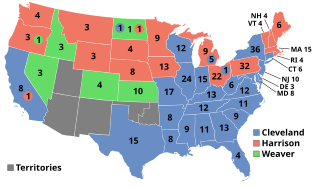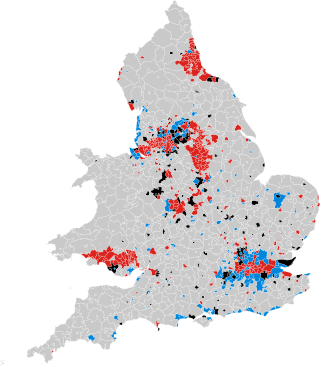
The 1892 United States presidential election was the 27th quadrennial presidential election, held on Tuesday, November 8, 1892. In the fourth rematch in American history, the Democratic nominee, former president Grover Cleveland, defeated the Republican incumbent, President Benjamin Harrison. Cleveland's victory made him the first and, to date, the only person in American history to be elected to a non-consecutive second presidential term. It was also the first of two occasions that incumbents were defeated in consecutive elections—the second being Gerald Ford's loss to Jimmy Carter in 1976, followed by Carter's loss to Ronald Reagan in 1980.

The 1968 United States presidential election was the 46th quadrennial presidential election, held on Tuesday, November 5, 1968. The Republican nominee, former vice president Richard Nixon, defeated both the Democratic nominee, incumbent vice president Hubert Humphrey, and the American Independent Party nominee, former Alabama governor George Wallace. This was the last election until 1988 in which the incumbent president was not on the ballot. This is the most recent election where a third-party candidate won a state.

The Twenty-sixth Amendment to the United States Constitution established a nationally standardized minimum age of 18 for participation in state and local elections. It was proposed by Congress on March 23, 1971, and it was ratified by three-quarters of the states by July 1, 1971.

The Indian National Congress (INC), colloquially the Congress Party or simply the Congress, is a political party in India with deep roots in most regions of India. Founded on 28 December 1885, it was the first modern nationalist movement to emerge in the British Empire in Asia and Africa. From the late 19th century, and especially after 1920, under the leadership of Mahatma Gandhi, the Congress became the principal leader of the Indian independence movement. The Congress led India to independence from the United Kingdom, and significantly influenced other anti-colonial nationalist movements in the British Empire.

The Communist Party of India (Marxist) (abbreviated as CPI(M)) is a communist political party in India. It is the largest communist party in India in terms of membership and electoral seats, and one of the national parties of India. The party was founded through a splitting from the Communist Party of India in 1964 and it quickly became the dominant faction.

The Janata Party is an unrecognized political party in India. It was founded as an amalgam of Indian political parties opposed to the Emergency that was imposed between 1975 and 1977 by Prime Minister Indira Gandhi of the Indian National Congress. In the 1977 general election, the party defeated the Congress and Janata leader Morarji Desai became the first non-Congress prime minister in independent modern India's history.

Janatha Vimukthi Peramuna is a Marxist–Leninist communist party in Sri Lanka. The party was formerly a revolutionary movement and was involved in two armed uprisings against the government of Sri Lanka: once in 1971 (SLFP), and another in 1987–89 (UNP). The motive for both uprisings was to establish a socialist state.

General elections were held in India between 1 and 10 March 1971 to elect members of the fifth Lok Sabha. They were the fifth general elections since independence in 1947. The 27 Indian states and union territories were represented by 518 constituencies, each with a single seat. Under the leadership of Indira Gandhi, the Indian National Congress (R) led a campaign which focused on reducing poverty and won a landslide victory, overcoming a split in the party and regaining many of the seats lost in the previous election.
The 1892 Democratic National Convention was held in Chicago, Illinois, from June 21 to 23, 1892. and nominated former President Grover Cleveland, who had been the party's standard-bearer in 1884 and 1888. This marked the last time a former president was renominated by a major party. Adlai Stevenson I of Illinois was nominated for vice president. The ticket was victorious in the general election, defeating the Republican nominees, President Benjamin Harrison and his running mate, Whitelaw Reid.
The Coalition Coupon was a letter sent to parliamentary candidates at the 1918 United Kingdom general election, endorsing them as official representatives of the Coalition Government. The 1918 election took place in the heady atmosphere of victory in the First World War and the desire for revenge on Germany and its allies. Receiving the coupon was interpreted by the electorate as a sign of patriotism that helped candidates gain election, while those who did not receive it had a more difficult time as they were sometimes seen as anti-war or pacifist. The letters were all dated 20 November 1918 and were signed by Prime Minister David Lloyd George for the Coalition Liberals and Bonar Law, the leader of the Conservative Party. As a result, the 1918 general election has become known as "the coupon election".

The 1971 Indian general election polls in Tamil Nadu were held for 39 seats in the state. After winning in 1967, DMK supported the Congress party under Indira Gandhi, and the 25 DMK MPs, ensured her to stay in power as a minority government, from 1969 to 1971. This state was crucial for Indira Gandhi to hold, in order for her to stay in power. The result was a victory for Indian National Congress (Indira) and its ally Dravida Munnetra Kazhagam winning 38 seats, while Opposition Congress and Swatantra Party could only win 1 seat. DMK won every seat it contested except the seat contested by K. Kamarajar in Nagercoil.

Indian National Congress (Requisitionists) was created in 1969; it was created and led by Indira Gandhi. The then unified Indian National Congress was split, with the other part being Indian National Congress (O).
Elections to Newham London Borough Council were held in May 1971. The whole council was up for election. Turnout was 27.3%. This election had aldermen as well as councillors. Labour won all ten aldermen positions.
The National Liberal Party was a liberal political party in the United Kingdom from 1922 to 1923. It was created as a formal party organisation for those Liberals, led by Prime Minister David Lloyd George, who supported the Coalition Government (1918–22) and subsequently a revival of the Coalition, after it ceased holding office. It was officially a breakaway from the Liberal Party. The National Liberals ceased to exist in 1923 when Lloyd George agreed to a merger with the Liberal Party.
This is a list of the members of the Dewan Rakyat of the 3rd Parliament of Malaysia, elected in 1969. From 1969 to 1971, the National Operations Council governed the country in lieu of the elected government. In 1971, the NOC was dissolved with the restoration of Third Parliament of Malaysia.

Local elections were held in borough and district councils in the United Kingdom in 1972, during the life of the Conservative government of Edward Heath. They were the last such elections in England and Wales to be held prior to major structural changes to councils brought about by the Local Government Act 1972.
Local elections were held in the United Kingdom in 1971, the year after the Conservatives under Edward Heath had taken office.
The 1971 Indian general election in Odisha were held for 20 seats with the state going to the polls in the first two phases of the general elections.
Elections to the fifith Odisha Legislative Assembly were held in 1971.
The 1971 Sabah state election were to be held in October 1971, after the State Assembly was dissolved on 20 September 1971. This was the second state election to take place.










